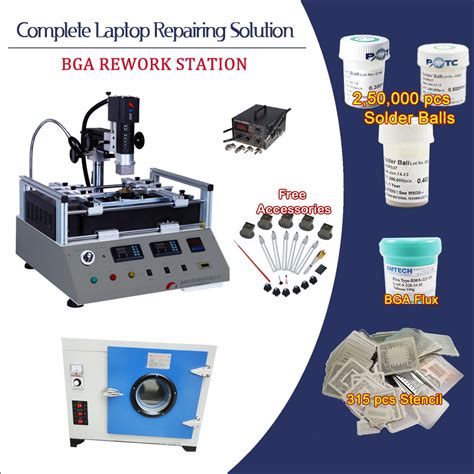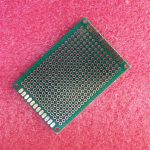What is BGA Rework?
BGA rework is the process of removing and replacing BGA components on a printed circuit board (PCB) without damaging the board or surrounding components. This intricate process requires specialized equipment, skilled technicians, and strict adherence to industry standards to ensure successful results.
Common Reasons for BGA Rework
- Manufacturing defects
- Component upgrades or replacements
- Design changes
- Thermal stress or mechanical damage
The BGA Rework Process
The BGA rework process typically involves the following steps:
- Pre-rework analysis: Technicians inspect the PCB and BGA component to identify any defects or damage.
- Component removal: Using specialized heating equipment, the faulty BGA component is carefully removed from the PCB.
- Site preparation: The PCB pad site is cleaned and prepared for the new BGA component.
- Component placement: The new BGA component is aligned and placed on the prepared site using precision placement equipment.
- Reflow: The PCB and new BGA component undergo a controlled heating process to establish secure connections between the component and the board.
- Inspection: The reworked area is thoroughly inspected to ensure proper alignment, solder joint integrity, and overall quality.
Choosing the Right BGA Rework Company
When selecting a BGA rework company, consider the following factors:
- Experience and expertise: Look for a company with a proven track record in BGA rework and experience with your specific components and PCB types.
- Equipment and facilities: Ensure the company uses state-of-the-art equipment and maintains a clean, ESD-controlled environment.
- Quality control: Inquire about the company’s quality control processes, certifications (e.g., IPC, ISO), and adherence to industry standards.
- Turnaround time: Discuss the company’s typical turnaround times and their ability to accommodate your project’s timeline.
- Customer support: Evaluate the company’s responsiveness, communication, and willingness to address your concerns throughout the rework process.

Top BGA Rework Companies
The following table lists some of the leading BGA rework companies known for their expertise and quality services:
| Company | Location | Services | Website |
|---|---|---|---|
| Acme BGA Rework | San Jose, CA | BGA rework, reballing, component upgrades | www.acmebgarework.com |
| BGA Solutions | Austin, TX | BGA rework, X-ray inspection, training | www.bgasolutions.com |
| Circuit Technology Center | Haverhill, MA | BGA rework, PCB Repair, design support | www.circuittechnologycenter.com |
| Precision PCB Services | Shenzhen, China | BGA rework, PCB Assembly, testing | www.precisionpcbservices.com |
| XYZ Electronics | Singapore | BGA rework, component sourcing, logistics | www.xyzelectronics.com.sg |
Note: This list is not exhaustive and is meant to provide a starting point for your research.
BGA Rework Equipment
To perform BGA rework, companies utilize specialized equipment, such as:
- BGA rework stations: These stations combine precision heating, alignment, and placement capabilities to remove and replace BGA components accurately.
- X-ray inspection systems: X-ray machines allow technicians to inspect solder joint quality and component placement beneath the BGA package.
- Soldering and desoldering tools: High-quality soldering irons, desoldering pumps, and solder paste dispensers are essential for BGA rework.
- Optical inspection equipment: Microscopes and digital imaging systems help technicians visually inspect the rework area for defects or irregularities.
Advantages of Professional BGA Rework Services
Engaging a professional BGA rework company offers several advantages, including:
- Expertise: BGA rework companies employ skilled technicians with extensive experience in handling various BGA packages and PCB types.
- Specialized equipment: Professional rework companies invest in high-end equipment to ensure precise, reliable results.
- Time and cost savings: Outsourcing BGA rework can be more cost-effective and time-efficient than attempting in-house repairs, especially for complex or high-volume projects.
- Quality assurance: Reputable BGA rework companies adhere to strict quality control processes and industry standards to deliver consistent, high-quality results.
Alternatives to BGA Rework
In some cases, alternatives to BGA rework may be more suitable:
- PCB replacement: If the PCB is severely damaged or the cost of rework exceeds the cost of a new board, replacing the entire PCB may be more economical.
- Component substitution: If a specific BGA component is unavailable or obsolete, a compatible substitute may be used, provided it meets the design requirements and specifications.
- Redesign: If recurring issues are encountered with a particular BGA component or design, consider redesigning the PCB to address the root cause of the problem.
Industry Standards and Certifications
When evaluating BGA rework companies, look for those that adhere to industry standards and hold relevant certifications, such as:
- IPC standards: IPC (Association Connecting Electronics Industries) develops standards for PCB design, fabrication, and assembly. Relevant standards include IPC-7711/7721 for rework and repair and IPC-A-610 for acceptability of electronic assemblies.
- ISO certification: ISO 9001 certification demonstrates a company’s commitment to quality management and continuous improvement.
- ESD control: Ensure the company follows ESD (electrostatic discharge) control practices to prevent damage to sensitive electronic components.
Challenges in BGA Rework
BGA rework presents several challenges that must be addressed by experienced professionals:
- Thermal management: Controlling the heating and cooling process is crucial to avoid thermal stress, warping, or damage to the PCB and surrounding components.
- Component alignment: Precise alignment of the BGA component with the PCB pads is essential for proper solder joint formation and reliable connections.
- Solder joint integrity: Ensuring complete solder melting and proper solder joint formation beneath the BGA package requires skill and specialized equipment.
- Underfill removal: Some BGA components use underfill material to enhance mechanical stability, which must be carefully removed during rework without damaging the PCB.
Conclusion
BGA rework is a complex process that requires expertise, specialized equipment, and adherence to industry standards. When selecting a BGA rework company, consider factors such as experience, equipment, quality control, and customer support. By partnering with a reliable BGA rework provider, you can ensure the success of your rework projects and maintain the integrity of your electronic assemblies.
Frequently Asked Questions (FAQ)
-
Q: How long does BGA rework typically take?
A: The duration of a BGA rework project depends on various factors, such as the complexity of the component, the PCB design, and the extent of the damage. Simple rework tasks may take a few hours, while more complex projects can span several days. Discuss your project’s timeline with the rework company to get a more accurate estimate. -
Q: Can all BGA components be reworked?
A: Most BGA components can be reworked, provided the PCB and surrounding components are not severely damaged. However, some advanced packages, such as fine-pitch or high-density BGAs, may require specialized equipment and expertise. Consult with the rework company to determine the feasibility of reworking your specific BGA component. -
Q: How much does BGA rework cost?
A: The cost of BGA rework varies depending on factors such as the complexity of the component, the extent of the damage, and the turnaround time required. Simple rework projects may cost a few hundred dollars, while more complex projects can exceed several thousand dollars. Request quotes from multiple rework companies to compare pricing and services. -
Q: Can I perform BGA rework in-house?
A: While it is possible to perform BGA rework in-house, it requires significant investment in specialized equipment, training, and skilled personnel. For most companies, outsourcing BGA rework to a professional service provider is more cost-effective and ensures higher quality results. -
Q: What should I do if my reworked BGA component fails?
A: If a reworked BGA component fails, contact the rework company immediately. Most reputable companies offer warranties or guarantees on their work. They will likely request that you return the board for analysis and rework if necessary. It’s essential to work closely with the rework company to identify the root cause of the failure and prevent future issues.






Leave a Reply